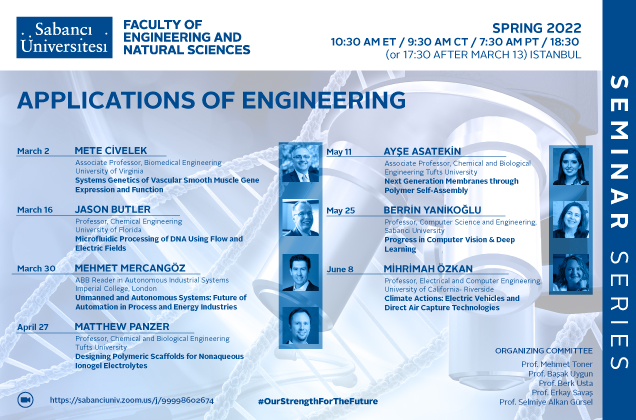“Next Generation Membranes through Polymer Self-Assembly''
“Next Generation Membranes through Polymer Self-Assembly''
Ayşe Asatekin, PhD


Asatekin lab focuses on new polymeric materials designed to self-assemble to impart improved and/or new functionality to separation membranes by controlling nano-scale morphology and surface functionality. Our work aims to develop new membranes for generating fresh water, treating wastewater, and process separations. We focus on preventing membrane fouling and controlling membrane selectivity while maintaining high flux and simple, scalable manufacturing methods.
In one research direction, we aim to understand how zwitterion-containing copolymers self-assemble, and utilize their behavior to develop membranes with improved capabilities. Zwitterions, functional groups with equal numbers of positive and negative charges, strongly resist fouling, defined as performance loss due to the adsorption and adhesion of feed components onto the membrane. They also easily self-assemble due to strong intermolecular interactions. We have developed high flux, fouling resistant, size-selective membranes utilizing the self-assembly of random copolymers of zwitterionic and hydrophobic monomers. The effective membrane pore size or ~1 nm closely matches the size of self-assembled zwitterionic nanodomains. These membranes are exceptionally fouling resistant, showing little to no flux decline during the filtration of a wide range foulants and complete flux recovery with a water rinse. We also showed that we can manipulate the selectivity of these membranes through either the inclusion of co-monomers or by cross-linking the copolymer after manufacture to create tighter pores. Using these approaches, we have developed membranes that exhibit subnanometer pores and extremely high sulfate/chloride selectivity.
We also aim to develop membranes that can separate small molecules of similar size based on their chemical properties. For this purpose, we prepared membranes by depositing micelles formed by random copolymers of a highly hydrophobic fluorinated monomer with methacrylic acid on a porous support. The gaps between the micelles act as 1-5 nm nanochannels functionalized with carboxylic acid groups. These membranes show charge-based selectivity between organic molecules. Furthermore, the carboxyl groups can be functionalized to alter the selectivity of the membrane. We used this method to prepare membranes that exhibit aromaticity-based selectivity. We believe these approaches will eventually lead to novel membranes that are capable of new separations and can replace more energy intensive methods such as distillation or extraction.